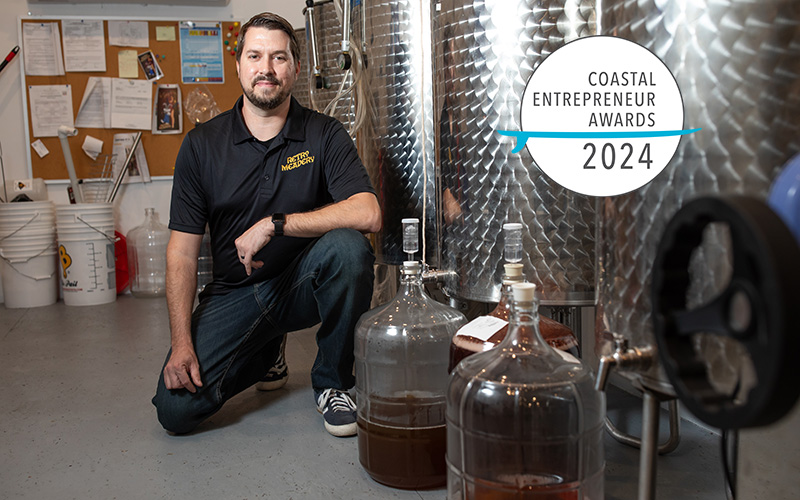This piece was contributed by the faculty members of the Cameron School of Business, who facilitated the research discussed: Donald C. Barnes, Jessica Mesmer-Magnus, Lisa L. Scribner, Alexandra Krallman and Rebecca M. Guidice
Introduction
For many firms the importance of customer service during the Covid-19 pandemic decreased as there were more immediate concerns over keeping businesses afloat. Moreover, it was unclear if customers could even overcome pandemic induced anxiety to experience such positive emotions. Making this situation more complicated was the fact that firms needed customers now more than ever. Thus, firms found themselves in a difficult situation – how to make customers happy (and therefore profitable) when everything seemed to be negative.
In the hopes of answering this question, researchers from the Cameron School of Business at UNCW studied customer emotions during the pandemic. Specifically, these researchers surveyed respondents to find instances where the respondent experienced customer delight during the pandemic.
Customer Delight in a Pandemic
The concept of customer delight arose from the understanding that satisfaction was often not enough to ensure beneficial customer behaviors (i.e. loyalty, positive word-of-mouth). Conversely, delighted customers are almost always linked to positive outcomes. In a recent review article, researchers from the Center for Sales Excellence & Customer Delight at UNCW found that nearly 95% of the research that has studied delight reported positive outcomes (e.g., delighted customers are more committed, engage in more word-of-mouth and are willing to pay more).
Understanding customer delight in a pandemic can theoretically be understood by assessing various customer needs and well-being. A noted psychologist, Susan Fiske, suggests there are five core social needs: trust, self-enhancing, belonging, understanding, and controlling. These needs can be grouped into three categories: affective needs (trust and self-enhancing), interpersonal needs (sense of belonging), and cognitive needs (understanding and control). Fulfillment of these needs enhances two types of well-being: hedonic and eudaimonic. The former refers to well-being based on pleasure, whereas, eudaimonic well-being is rooted in meaning and purpose. During a crisis, this distinction is important as hedonic consumption might not be possible; however, firms should be aware of alternative paths to create delight based on eudaimonic drivers of well-being.
What Can Firms Do?
Based on the results, firms can in fact delight customers by focusing on specific needs. To target the trust need, focus on issues related to safety. For example, clear messaging based on latest health standards and employing contact-less purchasing. For self-enhancement, coach your employees on finding ways to make customers feel special. Random surprise calls to show the customer is valued and not with the intent of closing a sale are also recommended. To create belonging, firms can utilize technology such as social media. To facilitate understanding, focus on educating the customer on issues the firm is facing. Perhaps the delivery time has to be later, but there is a reason. Finally, to impact the need for control, firms can provide ways for customers to co-produce the product/service.
In closing, it is important to understand that it is not just worldwide pandemics that create situations that change what is valued. Crises (job loss, illness, extreme weather) can emerge at any level. The sad fact is that crises can take many forms and co-occur or multiply in our lives. The good news for the firm: if you can address eudaimonic needs, customers can experience delight.
Robert T. Burrus, Jr., Ph.D., is the dean of the Cameron School of Business at the University of North Carolina Wilmington, named in June 2015. Burrus joined the UNCW faculty in 1998. Prior to his current position, Burrus was interim dean, associate dean of undergraduate studies and the chair of the department of economics and finance. Burrus earned a Ph.D. and a master’s degree in economics from the University of Virginia and a bachelor’s degree in mathematical economics from Wake Forest University. The Cameron School of Business has approximately 90 full-time faculty members and 30 administrative and staff members. The AACSB-accredited business school currently enrolls approximately 2,600 undergraduate students in three degree programs and 750 graduate students in four degree programs. The school also houses the prestigious Cameron Executive Network, a group of more than 200 retired and practicing executives that provide one-on-one mentoring for Cameron students. To learn more about the Cameron School of Business, please visit http://csb.uncw.edu/. Questions and comments can be sent to [email protected].
Passenger Rail Study Picks Eastern Route
Emma Dill
-
May 3, 2024
|
|
Entrepreneur Brings Young Tech Startup From Triangle To Wilmington
Audrey Elsberry
-
May 3, 2024
|
|
Biden To Announce National $3B Lead Pipe Replacement Project In Wilmington Visit
Audrey Elsberry
-
May 2, 2024
|
|
The Husk, YoSake Sell In Downtown Wilmington
Jessica Maurer
-
May 3, 2024
|
|
UPDATE: Biden Shares Details On National Lead Pipe Funding At Wilmington Talk
Audrey Elsberry
-
May 2, 2024
|
|

Whether community members want to paint a mug or build an invention, local entrepreneurs have created spaces where people can access the nee...

As Southeastern North Carolina’s only commercial mead maker, Retro Meadery has given many local customers their first taste of mead – a ferm...
Novant Health Heart & Vascular Institute has incorporated a recent FDA-approved treatment for AFib, or atrial fibrillation, as an option for...
The 2024 WilmingtonBiz: Book on Business is an annual publication showcasing the Wilmington region as a center of business.
